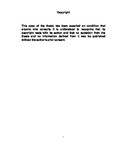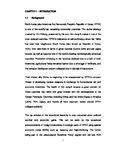North Korea: Transport and Logistics Scenarios and South Korean Enterprises' Location Decisions
| dc.contributor.supervisor | Dinwoodie, John | |
| dc.contributor.author | Pang, Kelvin Ka Liong | |
| dc.contributor.other | Plymouth Business School | en_US |
| dc.date.accessioned | 2012-02-10T08:32:09Z | |
| dc.date.available | 2012-02-10T08:32:09Z | |
| dc.date.issued | 2012 | |
| dc.identifier | 794998 | en_US |
| dc.identifier.uri | http://hdl.handle.net/10026.1/911 | |
| dc.description.abstract |
North Korea is one of the world’s last remaining communist countries. Insistence on self-sufficiency has resulted in the stagnation of its economy and collapse of its transport distribution system. This research project examines how various scenarios for North Korea and the implications of South Korean enterprises’ location decisions affect future transport and logistics developments in North Korea. In the foreseeable future, aside from Chinese companies, South Korean investors will probably be the only companies to invest heavily in the North, driven by political and economic motivations. The objectives of this study are four-fold. Firstly, it analyses the political and economic factors affecting North Korea. Secondly, it appraises the present conditions of transport and logistics infrastructure in North Korea. Next, in order to ascertain the implications of business organisations’ decisions to locate in North Korea, it is imperative to determine the probable scenarios surrounding North Korea due to its unique and reclusive nature. Finally, it identifies the factors that will affect potential investors’ location choices. In order to answer the above research question and objectives, a combination of qualitative and quantitative methods was used. In the absence of reliable data from North Korea, an exploratory study was undertaken with eight experts to gain deeper understanding of the issues surrounding North Korea. The insights gathered, together with the comprehensive literature review led to the development of eight sub-research questions. Next, in-depth qualitative interviews were conducted to help develop scenarios for North Korea. Quantitative surveys were concurrently conducted which engaged SMEs and logistics companies. The findings of the research uncovered new insights. Experts think that the status quo scenario is most likely to continue in the near future unless one of the wildcard situations, such as the death of Kim Jong-il occurs. Investors are likely to invest $1-9 million in North Korea, with Nampo and Sinuiju as probable investment locations. Four main factors will influence the location choices of potential South Korean investors including ‘legal’, ‘political economy’, ‘spatial’ and ‘infrastructure’. Road transport was found to be the choice of mode for both experts and investors and China and South Korea would be the mostly like export destinations for North Korean-made products. | en_US |
| dc.language.iso | en | en_US |
| dc.publisher | University of Plymouth | en_US |
| dc.subject | North Korea | en_US |
| dc.subject | Transport | |
| dc.subject | Logistics | |
| dc.subject | Scenarios | |
| dc.title | North Korea: Transport and Logistics Scenarios and South Korean Enterprises' Location Decisions | en_US |
| dc.type | Thesis | |
| dc.identifier.doi | http://dx.doi.org/10.24382/4488 | |
| dc.identifier.doi | http://dx.doi.org/10.24382/4488 |
Files in this item
This item appears in the following Collection(s)
-
01 Research Theses Main Collection
Research Theses Main



